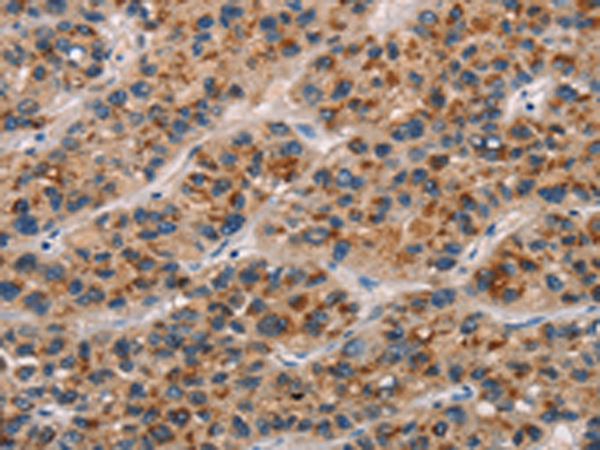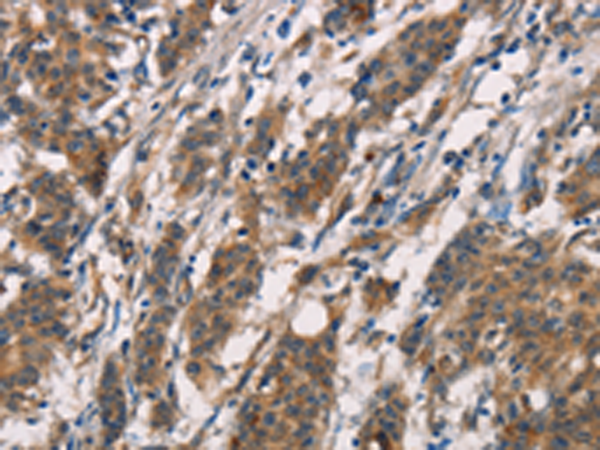

| WB | 咨询技术 | Human,Mouse,Rat |
| IF | 咨询技术 | Human,Mouse,Rat |
| IHC | 1/25-1/100 | Human,Mouse,Rat |
| ICC | 技术咨询 | Human,Mouse,Rat |
| FCM | 咨询技术 | Human,Mouse,Rat |
| Elisa | 1/1000-1/2000 | Human,Mouse,Rat |
| Aliases | B7; BB1; B7-1; B7.1; LAB7; CD28LG; CD28LG1 |
| Host/Isotype | Rabbit IgG |
| Antibody Type | Primary antibody |
| Storage | Store at 4°C short term. Aliquot and store at -20°C long term. Avoid freeze/thaw cycles. |
| Species Reactivity | Human |
| Immunogen | Synthetic peptide of human CD80 |
| Formulation | Purified antibody in PBS with 0.05% sodium azide and 50% glycerol. |
+ +
以下是3-4条关于CD80抗体的参考文献及其简要摘要:
---
1. **文献名称**: *"CD80 (B7-1) and CD86 (B7-2): Potential Targets for Therapeutic Intervention in Autoimmunity and Transplantation"*
**作者**: Lenschow DJ, Walunas TL, Bluestone JA
**摘要**: 该文献综述了CD80和CD86作为共刺激分子在T细胞激活中的作用,探讨了通过抗体阻断CD80/CD86与CD28的结合来抑制自身免疫反应和移植排斥的潜在治疗策略,并总结了早期动物模型中的实验结果。
---
2. **文献名称**: *"Anti-CD80 monoclonal antibody inhibits T cell activation in vitro and in vivo"*
**作者**: Noël PJ, Boise LH, Thompson CB
**摘要**: 研究通过体外和体内实验证明,抗CD80单克隆抗体能够有效抑制T细胞的活化和增殖,减少促炎细胞因子(如IL-2)的分泌,为治疗T细胞介导的自身免疫疾病(如类风湿性关节炎)提供了实验依据。
---
3. **文献名称**: *"Combination anti-CD80/anti-PD-1 therapy enhances antitumor immunity by promoting T cell infiltration and immune synapse formation"*
**作者**: Curran MA, Kim M, Montalvo W, et al.
**摘要**: 该研究通过小鼠肿瘤模型发现,联合使用抗CD80和抗PD-1抗体可显著增强抗肿瘤效果,其机制包括增加肿瘤浸润T细胞数量、促进免疫突触形成,并逆转肿瘤微环境中的免疫抑制状态。
---
4. **文献名称**: *"Structural basis of CD80/CD86 recognition by the T cell receptor CD28"*
**作者**: Stamper CC, Zhang Y, Tobin JF, et al.
**摘要**: 通过X射线晶体学解析了CD80与CD28的复合物结构,揭示了CD80结合CD28的关键表位,为设计靶向CD80的抗肿瘤或抗炎抗体提供了分子层面的理论支持。
---
以上文献涵盖基础机制、治疗应用及结构研究,均发表于高影响力期刊(如*Science*、*Nature Immunology*等),可作为CD80抗体研究的代表性参考文献。
CD80. also known as B7-1. is a cell surface protein expressed primarily on antigen-presenting cells (APCs) such as dendritic cells, macrophages, and activated B cells. It plays a critical role in T-cell activation by interacting with CD28 and CTLA-4 (CD152) receptors on T cells. The CD28-CD80 interaction provides a co-stimulatory signal required for full T-cell activation and immune response initiation, while CTLA-4 binding to CD80 delivers an inhibitory signal to dampen T-cell activity, maintaining immune homeostasis. This dual regulatory mechanism makes CD80 a key checkpoint in adaptive immunity.
CD80-targeting antibodies are designed to modulate this immune checkpoint. Blocking CD80 can interfere with co-stimulatory or inhibitory signaling, depending on the context. For example, anti-CD80 antibodies have been explored to suppress excessive immune activation in autoimmune diseases or to enhance anti-tumor immunity by disrupting CTLA-4-mediated suppression. Notably, the CTLA-4 inhibitor ipilimumab, a clinically approved immunotherapy for melanoma, indirectly impacts CD80/CD86-CTLA-4 interactions. Direct CD80 antibodies, though less clinically advanced, are being studied in combination therapies to optimize immune checkpoint blockade.
Research also investigates CD80's role in transplant tolerance and infectious diseases. Its expression on certain cancer cells further highlights therapeutic potential. However, balancing immune activation and suppression remains a challenge, requiring precise targeting strategies to avoid adverse effects.
×